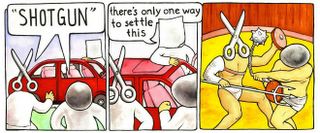miss ryan
5.26.2005
5.19.2005
How the Republicans Will Justify Abolishing Environmentalism
FBI, ATF address domestic terrorism
Officials: Extremists pose serious threat
From Terry Frieden
CNN
WASHINGTON (CNN) -- Violent animal rights extremists and eco-terrorists now pose one of the most serious terrorism threats to the nation, top federal law enforcement officials say.
Senior officials from the FBI and the Bureau of Alcohol, Tobacco, Firearms (ATF) and Explosives told a Senate panel Wednesday of their growing concern over these groups.
Of particular concern are the Animal Liberation Front (ALF) and the Earth Liberation Front (ELF).
John Lewis, the FBI's deputy assistant director for counterterrorism, said animal and environmental rights extremists have claimed credit for more than 1,200 criminal incidents since 1990. The FBI has 150 pending investigations associated with animal rights or eco-terrorist activities, and ATF officials say they have opened 58 investigations in the past six years related to violence attributed to the ELF and ALF.
In the same period violence from groups like the Ku Klux Klan and anti-abortion extremists have declined, Lewis said.
The ELF has been linked to fires set at sport utility vehicle dealerships and construction sites in various states, while the ALF has been blamed for arson and bombings against animal research labs and the pharmaceutical and cosmetics industry.
No deaths have been blamed on attacks by those groups so far, but the attacks have increased in frequency and size, said Lewis.
"Plainly, I think we're lucky. Once you set one of these fires they can go way out of control," Lewis said.
ATF Deputy Assistant Director Carson Carroll agreed with Lewis' assessment.
"The most worrisome trend to law enforcement and private industry alike has been the increase in willingness by these movements to resort to the use of incendiary and explosive devices," he said.
The FBI also identified a British-based group, Stop Huntingdon Animal Cruelty, as a U.S. terror threat. The group targets Britain's Huntingdon Life Sciences Laboratory, which has an American facility in East Millstone, New Jersey.
Last year a federal grand jury indicted seven people identified as members of the group on charges they vandalized company property and harassed lab employees and customers.
Inhofe alleges PETA link
Senate Environment Committee Chairman James Inhofe estimated the cost of damages from militant environmental and animal rights supporters at more than $110 million in the past decade.
"Just like al Qaeda or any other terrorist movement, ELF and ALF cannot accomplish their goals without money, membership and the media," the Republican senator from Oklahoma said.
Inhofe said there was "a growing network of support for extremists like ELF and ALF," and he singled out People for the Ethical Treatment of Animals for giving money to members of both groups.
PETA claims more than 800,000 members. Its president, Ingrid Newkirk, declined to appear at the hearing, but general counsel Jeffrey Kerr denied Inhofe's allegation in a written statement.
"PETA has no involvement with alleged ALF or ELF actions. PETA does not support terrorism. PETA does not support violence," Kerr said.
"In fact PETA exists to fight the terrorism and violence inflicted on billions of animals annually in the meat, dairy, experimentation, tobacco, fur, leather, and circus industries."
Skepticism from some
Some committee members have expressed skepticism over the high level of concern toward environmental and animal rights extremists.
"The Department of Homeland Security spends over $40 billion a year to protect the home front," Sen. Frank Lautenberg said. After listing al Qaeda, Hamas and Hezbollah, the Democrat from New Jersey wanted to know who else the law enforcement agencies considered terrorists: "Right to Life? Sierra Club?"
Lautenberg declared himself "a tree hugger."
And Sen. James Jeffords also issued a statement expressing doubt about the target of concern.
"Congress can't do much about individual extremists committing crimes in the name of ELF or ALF, but we can act to significantly enhance the safety of communities across the nation," the independent from Vermont wrote.
"ELF and ALF may threaten dozens of people each year, but an incident at a chemical, nuclear or wastewater facility would threaten tens of thousands."
From Terry Frieden
CNN
WASHINGTON (CNN) -- Violent animal rights extremists and eco-terrorists now pose one of the most serious terrorism threats to the nation, top federal law enforcement officials say.
Senior officials from the FBI and the Bureau of Alcohol, Tobacco, Firearms (ATF) and Explosives told a Senate panel Wednesday of their growing concern over these groups.
Of particular concern are the Animal Liberation Front (ALF) and the Earth Liberation Front (ELF).
John Lewis, the FBI's deputy assistant director for counterterrorism, said animal and environmental rights extremists have claimed credit for more than 1,200 criminal incidents since 1990. The FBI has 150 pending investigations associated with animal rights or eco-terrorist activities, and ATF officials say they have opened 58 investigations in the past six years related to violence attributed to the ELF and ALF.
In the same period violence from groups like the Ku Klux Klan and anti-abortion extremists have declined, Lewis said.
The ELF has been linked to fires set at sport utility vehicle dealerships and construction sites in various states, while the ALF has been blamed for arson and bombings against animal research labs and the pharmaceutical and cosmetics industry.
No deaths have been blamed on attacks by those groups so far, but the attacks have increased in frequency and size, said Lewis.
"Plainly, I think we're lucky. Once you set one of these fires they can go way out of control," Lewis said.
ATF Deputy Assistant Director Carson Carroll agreed with Lewis' assessment.
"The most worrisome trend to law enforcement and private industry alike has been the increase in willingness by these movements to resort to the use of incendiary and explosive devices," he said.
The FBI also identified a British-based group, Stop Huntingdon Animal Cruelty, as a U.S. terror threat. The group targets Britain's Huntingdon Life Sciences Laboratory, which has an American facility in East Millstone, New Jersey.
Last year a federal grand jury indicted seven people identified as members of the group on charges they vandalized company property and harassed lab employees and customers.
Inhofe alleges PETA link
Senate Environment Committee Chairman James Inhofe estimated the cost of damages from militant environmental and animal rights supporters at more than $110 million in the past decade.
"Just like al Qaeda or any other terrorist movement, ELF and ALF cannot accomplish their goals without money, membership and the media," the Republican senator from Oklahoma said.
Inhofe said there was "a growing network of support for extremists like ELF and ALF," and he singled out People for the Ethical Treatment of Animals for giving money to members of both groups.
PETA claims more than 800,000 members. Its president, Ingrid Newkirk, declined to appear at the hearing, but general counsel Jeffrey Kerr denied Inhofe's allegation in a written statement.
"PETA has no involvement with alleged ALF or ELF actions. PETA does not support terrorism. PETA does not support violence," Kerr said.
"In fact PETA exists to fight the terrorism and violence inflicted on billions of animals annually in the meat, dairy, experimentation, tobacco, fur, leather, and circus industries."
Skepticism from some
Some committee members have expressed skepticism over the high level of concern toward environmental and animal rights extremists.
"The Department of Homeland Security spends over $40 billion a year to protect the home front," Sen. Frank Lautenberg said. After listing al Qaeda, Hamas and Hezbollah, the Democrat from New Jersey wanted to know who else the law enforcement agencies considered terrorists: "Right to Life? Sierra Club?"
Lautenberg declared himself "a tree hugger."
And Sen. James Jeffords also issued a statement expressing doubt about the target of concern.
"Congress can't do much about individual extremists committing crimes in the name of ELF or ALF, but we can act to significantly enhance the safety of communities across the nation," the independent from Vermont wrote.
"ELF and ALF may threaten dozens of people each year, but an incident at a chemical, nuclear or wastewater facility would threaten tens of thousands."
5.17.2005
5.15.2005
Full Frontal Offense: Taking Abortion Rights to the Tees (www.bitchmagazine.com)
There’s a new front in the battle for abortion rights—the literal front, that is, of a t-shirt designed by writer and feminist activist Jennifer Baumgardner that proclaims “I had an abortion.” The shirt, initially for sale on Planned Parenthood’s national website and now available on Clamor magazine’s website, has generated controversy among not only the antiabortion community but also pro-choice feminists.
Inspired in part by the bold irreverence of second-wave feminists, who circulated a petition proclaiming the fact of their own abortions and published it in the first issue of Ms., Baumgardner created the t-shirt in order to remove the stigma that relegates those who have had an abortion to shame and silence. The shirt is one component of a multipart project Baumgardner conceived to draw attention to women’s experiences of abortion. . .
“The shirt was always the least significant part of the project,” Baumgardner says, explaining that she printed 500 shirts, mailing some to influential feminists and selling the rest at last April’s March for Women’s Lives in Washington, D.C. Soon afterward, Planned Parenthood offered to carry the shirt on their website to “remind everyone that abortion policy affects real people,” according to Gloria Feldt, president of the organization. When the Drudge Report posted a photograph of the shirt on its opening page, however, what a Planned Parenthood media representative termed a “media tsunami” soon followed. . .
In one respect, creating a t-shirt to proclaim the reality of abortion in the plainest of language is the perfect antidote to the climate of fear that informs the ongoing battle for women’s reproductive rights. The Bush administration’s attack on public health—including sex education, as well as abortion—is taking place in multiple arenas. Family-planning organizations that receive federal funding are forbidden to present information about abortion to their clients. President Bush has refused to provide federal funding for research on new stem-cell lines because the cells are garnered from embryonic tissue. The successful passage in Congress of the Partial Birth Abortion Ban has caused doctors who perform abortions to fear for their medical licenses because the law’s wording is so vague.
The recent passage of the Unborn Victims of Violence Act, which allows a defendant to be charged with two federal crimes when a fetus is killed or injured during an attack on the pregnant woman, presents an even greater challenge to Roe v. Wade, because it creates a precedent in which the fetus is granted the legal status of a person. The House has also passed a bill that allows healthcare providers who oppose abortion not only to refuse to give their patients information about abortion or perform the procedure but also to deny them emergency contraception; it would also prevent government officials from penalizing healthcare institutions for refusing to provide information or services to their patients.
The Republican Party platform contains a plank calling for an explicit ban on all forms of abortion, even if the health of the mother is endangered.
In the face of such a far-reaching anti-choice agenda, the presence of women wearing t-shirts proclaiming their decision to have an abortion would seem a forceful response. As Barbara Ehrenreich recently reminded readers in a New York Times editorial, “Abortion is legal—it’s just not supposed to be mentioned or acknowledged as an acceptable option.” Since Roe v. Wade, she writes, “at least 30 million American women” have had abortions, “a number that amounts to about 40 percent of American women.” Yet according to a 2003 survey conducted by a pro-choice organization, “only 30 percent of women were unambivalently pro-choice.” Ehrenreich logically surmises that many women who refuse to state publicly that they are pro-choice have nevertheless obtained safe, legal abortions. By remaining silent about their experience, or by refusing to call the act of terminating a pregnancy because of fetal birth defects an abortion, these women are tacitly supporting those who seek to outlaw abortion. To be vocal about abortion—not by supporting an abstract “freedom of choice,” but instead by naming abortion as a fact of women’s experience—is thus to break the dual threat of political and private shaming that keeps women silent.
That both Ehrenreich and Baumgardner have called upon women to speak publicly about their abortions is no coincidence; rather, it represents their desire to honor, and perhaps resuscitate, a tactic integral to the politics of second-wave feminism. Many of the political agendas of second-wave feminists were the by-product of consciousness-raising groups, which encouraged women to speak out—not only to break the silences that foster discrimination but also to build community. This legacy of speech-as-activism is still found in Take Back the Night vigils—in which women name their experiences of physical and sexual abuse—as well as in the explosion of feminist zines and the music of riot grrrls.
Like Ehrenreich, who called for women to “take your thumbs out of your mouths, ladies, and speak up for your rights,” Baumgardner sees a direct correlation between the increase in women’s speech and the increase in their rights. “When women were most vocal about their experiences of abortion,” she said, “Roe. v. Wade was enacted. Now that women are silent about their experiences of abortion, we are seeing a decline in their reproductive rights.” Given this history of feminist politics, it’s no surprise that Planned Parenthood, which initially agreed to sell 200 shirts on its website, sold out so quickly that it had to refer potential customers to Baumgardner’s site to meet the demand. Ehrenreich wears her shirt to the gym; Ani DiFranco wore hers to an interview with Inc., an apolitical business magazine. When the photograph of DiFranco sporting the shirt and holding her guitar appeared, readers wrote to the editors to protest, sparking an extended dialogue about abortion rights on Fresh Inc., the magazine’s blog. . .
The logical question to ask, then, is the extent to which the fact of having an abortion is an aspect of a woman’s identity. The decision to have an abortion is complex. A woman may respond to having an abortion with relief, guilt, grief, or any number or combination of emotions, each of which will contribute in some way to her identity.
And what about the shirt as a fashion statement? If a woman wears the shirt because she likes it but hasn’t had an abortion herself, she could be seen as an ally in struggle, or she could be faulted for appropriating another woman’s experience—or, worse, disregarding it altogether. It all depends upon the way others perceive her. An activist from California told me that she wants to see as many women as possible wearing the shirt, regardless of whether they’ve had an abortion, to “participate in the collective destigmatizing of the procedure.” To represent the fact of abortion, as the shirt certainly does, is not equivalent to representing experience. It’s only an opening line.
But the question of representation is not limited to the shirt itself. The woman who wears the shirt creates a context for its reception in multiple ways. Her appearance, the location in which she wears it, and the fact of her being alone or in a group all add to the shirt’s meaning. A woman wearing the shirt in a progressive city like Madison, Wisconsin, or Olympia, Washington, or in a “hate-free-zone” neighborhood like Atlanta’s Little Five Points would probably get a reaction, but she’d be as likely to receive positive as negative comments.
What about the shirt’s power to belie the stereotype of the kind of woman who has an abortion? A married suburban mother keeping a distracted eye on the children spilling out of her minivan is just as likely to have had an abortion as a single woman in her early 20s. If it comes as a shock to picture the shirt worn by a middle-aged, middle-class woman, it’s a testament to the success of conservative rhetoric in casting woman who choose abortion as irresponsible, selfish, or overly careerist.
The negative reaction many feminists have to the shirt reveals a fundamental contradiction in the current state of pro-choice politics—or, more precisely, the extent to which those who are pro-choice feel ashamed, at some level, to support abortion. The fact that so many women read a simple statement as a “celebration” of the procedure speaks volumes about the feelings women have internalized as a consequence of the conservative assault on women’s rights. Although most of the women I spoke with were uneasy about their response to the shirt, repeatedly insisting that they were pro-choice even as they told me they would never wear it, some reacted to a photograph of the shirt with anger.
“The only reason anyone would wear such a shirt would be to piss people off,” one 19-year-old woman snorted. “No one who was serious about supporting abortion rights would wear it.” Those who saw the shirt as an aggressive tactic also thought it was perfect ammunition for the antiabortion movement, playing into the propaganda that paints pro-choice women as glorying in the selfish taking of a life. And judging from the comments on conservative blogs like Outside the Beltway and Baby Center, this argument has some merit. Amidst the usual vitriol and sardonic humor (one person wrote that the back of the shirt should say “Roe v. Wade—Eliminating Future Democrats One Choice at a Time”) is a sense that, by creating a t-shirt so many would see as offensive, the pro-choice movement had intentionally sought to outrage the Christian right.
In fact, the fear that the shirt could inflame the existing passions of the anti-choice movement has led some Planned Parenthood affiliates to condemn it. . .
It’s important to recognize the extent to which the attention of the pro-choice movement has shifted away from the bodies and lives of women who need abortions and toward those who aim to strip women of the right to control their reproductive lives. So it’s not surprising that a large part of the movement is plagued by the notion that anti-choicers riled up by the sight of women proclaiming their abortions on their chests will want to step up their efforts to deny them this power. Given this fear, it would seem a smart strategy to keep quiet, stay under the radar, and hope that women will vote anti-choice legislators out of office. Such a focus, however, ignores the effect pro-choice speech, including the shirt, might have on a woman feeling isolated and ashamed because she had had an abortion or is considering it. A public sisterhood of those who have chosen abortion, for a variety of personal reasons, could do a lot to counteract the hateful rhetoric of the anti-choice movement.
Baumgardner’s t-shirt is a lightning rod for the emotions that surround the abortion issue—especially among feminists—because it forces the current unspoken contradiction of the pro-choice movement into public speech. It’s smart to recognize the current political climate, the fact that abortion providers have been targeted and killed and clinics bombed, and that women’s health clinics operate under the awareness that their staff might be assaulted or murdered for doing their job. In the face of real violence and real political majorities, it might seem logical to lie low and safeguard the rights of women by creating an environment in which they can exercise their right to terminate a pregnancy without fearing for their lives. At the same time, some of the most powerful slogans from both the feminist and gay rights movements focus on the act of speaking up: “Your silence will not protect you.” Keeping quiet might seem like a smart political tactic, but when women muzzle themselves because they are afraid, their silence can masquerade as the appearance of support for the anti-choice agenda.
If we don’t break the silence about abortion, our right to control our reproductive destiny will never seem as natural as the right to wear our political opinions on a shirt.
by Rebecca Hyman
5.12.2005
TAKE BACK AMERICA!
Calling all liberal Americans.. i.e. Sane Americans
"George Bush and the right wing of Congress are going for it all. They are trying to...
PRIVATIZE SOCIAL SECURITY
and dismantle the social safety net.
OCCUPY IRAQ and have the
United States police the globe
Pack the courts and undermine
CORPORATE ACCOUNTABILITY
CRUSH UNIONS and
leave workers on their own
Turn back the clock on
CIVIL RIGHTS, WOMEN'S RIGHTS,
GAY RIGHTS and the ENVIRONMENT
They have the White House, right wing majorities in Congress,
an aggressive message machine, an energized base, and hundreds
of millions of dollars from corporate lobbies to manipulate our political system.
But we are going to stop them. A new PROGRESSIVE MAJORITY is coming together."





















